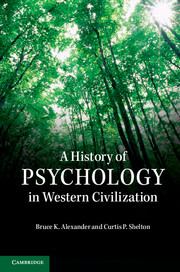Book contents
- Frontmatter
- Dedication
- Contents
- List of figures
- List of tables
- Preface
- Acknowledgements
- 1 Introduction: Two histories of Western psychology
- 2 Rationalism: Plato and the “just” person
- 3 Stoicism: Marcus Aurelius and the sufficient self
- 4 Christianity: St. Augustine and the incomplete soul
- 5 Materialism: Thomas Hobbes and the human machine
- 6 Empiricism: John Locke, David Hume, and experience as reality
- 7 Evolution: Charles Darwin and Homo sapiens as a work in progress
- 8 Medicine: Sigmund Freud and the world of neurotics
- 9 Re-imagining psychology
- Appendix A Plato’s nature of intelligence and other faculties
- Appendix B The search for Aunt Lena
- Index
- References
6 - Empiricism: John Locke, David Hume, and experience as reality
Published online by Cambridge University Press: 05 July 2014
- Frontmatter
- Dedication
- Contents
- List of figures
- List of tables
- Preface
- Acknowledgements
- 1 Introduction: Two histories of Western psychology
- 2 Rationalism: Plato and the “just” person
- 3 Stoicism: Marcus Aurelius and the sufficient self
- 4 Christianity: St. Augustine and the incomplete soul
- 5 Materialism: Thomas Hobbes and the human machine
- 6 Empiricism: John Locke, David Hume, and experience as reality
- 7 Evolution: Charles Darwin and Homo sapiens as a work in progress
- 8 Medicine: Sigmund Freud and the world of neurotics
- 9 Re-imagining psychology
- Appendix A Plato’s nature of intelligence and other faculties
- Appendix B The search for Aunt Lena
- Index
- References
Summary
Only thirty-nine years after Hobbes revitalized the materialist perspective on psychology, a modernized version of a different psychological perspective began to enthrall scholars all over Europe. John Locke (1632–1704) wrote a fresh version of the ancient empirical perspective that inspired many readers, including David Hume (1711–1776) and a string of others now known as the British Empiricists.
But how could there have been such great interest in another perspective on psychology so soon after Hobbes had brilliantly modernized the materialist perspective? Part of the answer is that although Locke lived very close in time and place to Hobbes, the realities that these two scholars confronted were worlds apart. Things were changing very quickly, opening new space for different views on human nature. From the middle of the seventeenth to the end of the eighteenth century, Europe was caught up in the whirlwind of the Enlightenment, which included religious radicalism, political innovation, industrial revolution, and philosophical optimism (Jones, 1975, chap. 1). As Hobbes was writing Leviathan in the first half of the seventeenth century, England’s old style monarchy was desperately hanging on, under attack from every conceivable direction. By the end of that century, the old regime was gone forever. An effective and popular framework of constitutional monarchy, religious toleration, and global trade had been consolidated in the Glorious Revolution of 1688, propelling England on its way to becoming the most modern state in Europe and the hub of an immense global empire (Pincus, 2009).
- Type
- Chapter
- Information
- A History of Psychology in Western Civilization , pp. 257 - 332Publisher: Cambridge University PressPrint publication year: 2014



